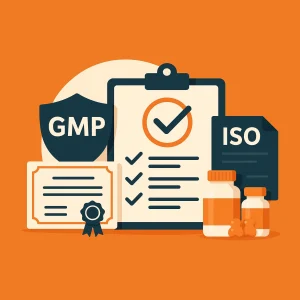What is Citicoline?
Citicoline is the common name for CDP-choline, a naturally occurring metabolite found in all living cells. CDP-choline plays a key role as an intermediate in the synthesis of structural phospholipids that make up cell membranes. It’s also tied to acetylcholine metabolism, making citicoline a source of both choline and cytidine when taken as a supplement. Choline is essential for many neurochemical processes—it’s a precursor and metabolite of acetylcholine, supports single-carbon metabolism, and is a core component of various membrane phospholipids.⁵
When consumed, citicoline breaks down into cytidine and choline, which are absorbed and used in the body’s normal metabolic processes. Choline is especially vital as a precursor for acetylcholine and phospholipids, crucial for learning, memory, and healthy neuronal membranes and myelin sheaths.¹
What Does Citicoline Do?
To put it simply, citicoline supplementation can support brain performance and memory. It has been studied for a variety of conditions, including stroke, dementia, bipolar disorder, and depression.⁴
Before it was widely accepted as a dietary ingredient, citicoline was commonly prescribed for both acute (like ischemic stroke or brain trauma) and chronic neurological disorders (such as dementia or Parkinson’s disease).¹
Research shows that citicoline has strong neuroprotective potential. One mechanism is its effect on increasing sirtuin-1 levels, which may offer protection in neurodegenerative conditions like Parkinson’s and Alzheimer’s.²
Citicoline contributes to the synthesis of phosphatidylcholine—a major component of cell membranes. This helps repair damaged neuronal membranes. When choline is scarce, the body breaks down phospholipids to restore choline levels. Supplementing with citicoline offers an external source that spares those phospholipids.²
It can also boost dopamine and norepinephrine levels in the central nervous system, which supports the brain during stress or oxygen deprivation. It raises serotonin and reduces glutamate levels—particularly useful during ischemic events, where NMDA receptor overactivation can damage neurons.²
In summary, citicoline may help regenerate neurons, support neurotransmitter levels, and improve cognitive function. It’s also being explored as a potential adjunct treatment for mood and depressive disorders.²
Which Foods Contain Citicoline?
Citicoline occurs naturally in many foods, especially:
- Whole grains like brown rice and whole wheat bread
- Quinoa
- Fatty fish and seafood like sardines, tuna, shrimp, mackerel, and salmon
- Legumes such as lentils, chickpeas, and beans
- Nuts and sunflower seeds
- Organ meats like liver and brain
- Lean meats such as beef, chicken breast, and turkey
- Soybeans and soy-based foods
- Vegetables like carrots, broccoli, and Brussels sprouts
Eggs are also a great source—especially the yolk, which is rich in phosphatidylcholine. That said, if your diet falls short, citicoline supplements (especially in gummy form) are a convenient and tasty alternative for both kids and adults.
What Is Citicoline Used For Today?
Citicoline is commonly used today to help improve focus and attention—something many of us struggle with in our busy lives. For children facing attention difficulties, especially at school, it may be a helpful supplement. It’s also popular during exam periods, presentations, and high-demand work phases. Gummy supplements like those from Y’our Gummie make it easier and more enjoyable to support your cognitive health amid daily stressors.
What Citicoline Supplements Are Available?
Citicoline is available in liquid, capsule, and chewable gummy forms. Gummies are especially user-friendly, appealing to both kids and adults. Formulas often combine citicoline with other brain-supporting nutrients like phosphatidylserine, phosphatidylcholine, omega-3 fatty acids, methylcobalamin, and botanical extracts.
Who Can Benefit from Citicoline?
Citicoline has been researched for its potential benefits in conditions like depression, schizophrenia, stroke, Parkinson’s disease, brain injuries, and cognitive impairments (including dementia and Alzheimer’s disease). Regular use may offer support in these cases, though it should always be taken under medical supervision, as more clinical data is still needed.³
Are There Any Side Effects or Precautions?
Because citicoline is naturally present in the body, it’s generally considered safe and well-tolerated. Research—including a 2021 study—indicates side effects are rare and mild.
Potential side effects may include:
- Headache
- Nausea
- Stomach discomfort
- Diarrhea or constipation
- Restlessness
It may interact with certain medications, like levodopa, used in Parkinson’s treatment. Always consult your healthcare provider before starting a new supplement, especially if you’re taking medication.⁴
Key Takeaways
Once consumed, citicoline is rapidly absorbed and broken down into choline and cytidine. These then convert into their active forms (choline and uridine) and get to work in the body. Think of citicoline as a “pro-nutrient”—similar to a pro-drug in pharmaceuticals—because it produces active nutrients once inside your body.¹
Let’s discover the Citicoline Gummy, crafted with Gummy Worlds’ trusted quality. These bottles offer a unique blend of effective ingredients and great taste in perfect harmony. Looking for a smart way to support your focus on busy days? Discover this delicious boost designed to enhance your cognitive power and keep your mind sharp all day long.
Referanslar
- Świątkiewicz M, Grieb P. Sitikoline for Supporting Memory in Aging Humans. Aging Dis. 2023 Aug 1;14(4):1184-1195. doi: 10.14336/AD.2022.0913. PMID: 37196134; PMCID: PMC10389840.
- Jasielski P, Piędel F, Piwek M, Rocka A, Petit V, Rejdak K. Application of Sitikoline in Neurological Disorders: A Systematic Review. Nutrients. 2020 Oct 12;12(10):3113. doi: 10.3390/nu12103113. PMID: 33053828; PMCID: PMC7601330.
- https://www.drugs.com/npp/sitikoline.html
- https://www.healthline.com/health/sitikoline
- Secades JJ, Gareri P. Sitikoline: pharmacological and clinical review, 2022 update. Rev Neurol. 2022 Nov 30;75(s05):S1-S89. English, Spanish. doi: 10.33588/rn.75s05.2022311. PMID: 36544369; PMCID: PMC10548480.






